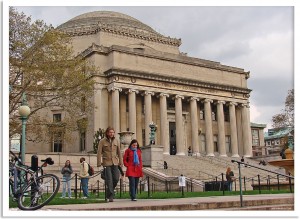In a recent interview for the Saudi Gazette, officials at the U.S. Embassy in Riyadh talked about some of the biggest mistakes students make when applying for their F-1 student visas, and gave advice for getting through the process successfully.
It was the second time this month we heard visa tips from real visa officials – last week David Donahue, the U.S. deputy assistant secretary for visa services, gave three tips to students applying for visas to study in America:
1) Apply early
2) Be informed
3) Be prepared
Watch Mr. Donahue give this advice in a video from the State Department
According to Robin A. Busse, Non-Immigrant Visa Chief and David B. Rochford, Vice Consul at the American Embassy in Riyadh, one of the biggest mistakes students make is not following Donahue’s first tip – applying too late for their visa.
They tell the Saudi Gazette that students should schedule their interview 3-4 months before classes begin – whether or not they have their I-20 paperwork in hand.
If a student schedules an interview within that time, and still has not received the I-20, he/she should contact the school and ask for the I-20 to be emailed in time for the interview. If students wait to receive the I-20 before scheduling an interview, they risk not having enough time for visa processing if shorter than 3-4 months before classes begin.
…
More than 73 percent of applicants receive their visas within 4-6 weeks. A student who applied the recommended 3-4 months ahead of the start of classes has a 93 percent likelihood of making his start date on time.
Another big mistake students make, they say, is coming to their interview unprepared (number 3 in Donahue’s tips, if you’re keeping track).
A student who does not show up for the interview with appropriate paperwork, and has no idea where or what s/he wants to study is not a credible student. Students are expected to have a certain degree of knowledge about their academic plans.
[More advice for the visa interview]
In addition to proving they are a credible student, applicants must show the consular officer that they intend to return home after their education. The Trinidad Express (in Trinidad and Tobago) has a regular “Ask the U.S. Consul” column, and a few years ago the Consul explained how to prove your ties to your home country:
The most important thing you need to know is that our officers are required by US Immigration Law, to assume that all applicants intend to immigrate and live permanently in the United States until they prove to the officer otherwise. This is the same at every Embassy and Consulate throughout the world, not just in the Caribbean, and certainly not just in Trinidad and Tobago.
What this means is that the burden of proof is on YOU, the applicant, to prove to the officer that you will return to Trinidad and Tobago after your visit to the US.
So what are ties? Basically a tie is something that will require you to return to Trinidad or Tobago within a reasonable amount of time.
Ties can be a variety of things, but, generally speaking, our officers look at personal, professional, and economic ties. Our officers do not use a check-list of requirements; instead, they try to learn as much information about the applicant, including things like his or her family situation, employment history, financial ability to pay for a trip, travel history, or plans for the future. Then, based on the ties that the applicant has shown, the officer determines whether or not the applicant is qualified for a visa.
An applicant also has to prove to the consular officer they have adequate financial resources to support themselves in the U.S.
[How much does it cost to get a visa?]
Here’s one final tip from the visa officials in Riyadh, which might help you get your visa processed successfully and on time:
Many students do not properly fill out the DS-160 visa application form, leaving out crucial information that actually will delay their visa processing. tudents should take care in filling out the form and answer all questions completely and truthfully. While some applicants choose to have a vendor fill out the DS-160, some vendors do a sloppy job of filling out the form which at best will delay the student’s visa processing or, in the worst case, could cause major problems.

 Javaria Khan
Javaria Khan What Does it Mean to "Be American" as a Chinese Student?
What Does it Mean to "Be American" as a Chinese Student? Why You Will Gain 10 Pounds in America (and How to Lose it Again)
Why You Will Gain 10 Pounds in America (and How to Lose it Again) Just When I Learn the Answers, They Change the Questions: A Zimbabwean's Journey
Just When I Learn the Answers, They Change the Questions: A Zimbabwean's Journey Top 5 Ways Academics in the US Are Different
Top 5 Ways Academics in the US Are Different What is the Best University in America?
What is the Best University in America? Financial Aid Tips from Admissions Officers
Financial Aid Tips from Admissions Officers How I Made Myself a Good Candidate for US Admissions (and Other Advice from a Successful Applicant)
How I Made Myself a Good Candidate for US Admissions (and Other Advice from a Successful Applicant) 5 Stories That Might Change How You See the World
5 Stories That Might Change How You See the World Battling Rejection? 5 Stories to Get Inspired
Battling Rejection? 5 Stories to Get Inspired Why a Weak SAT Score Didn’t Kill My College Dreams
Why a Weak SAT Score Didn’t Kill My College Dreams Are You Competitive Enough to Make it in America?
Are You Competitive Enough to Make it in America? Staying Safe: A Story No One Should Have to Tell
Staying Safe: A Story No One Should Have to Tell
7 Responses to “Student Visa Tips from Visa Officers”
[...] [For tips on what you SHOULD do in your interview, check out our previous story "Visa Tips from Visa Officers"] [...]
[...] somehow, they have to send their documentations,” Azadeh says, and proceeds to tell her story of applying for her F-1 visa: On going to the embassy: There is no American embassy in my country. So we have to go to other [...]
[...] was a great time and we covered a lot of topics, including what it costs, how to get scholarships, what you have to do to get a visa, whether international students are allowed to work, and how to improve your [...]
[...] For some advice on how to make the process go smoothly, check out this previous post: “Visa Tips From Visa Officers.” [...]
[...] 1) I’ve got my I-20 and my financial statements ready… [...]
[...] might remember we have previously shared advice from visa officers for getting your student visa. They explained how to set yourself up for a successful visa interview by applying early, coming [...]
i will love to study for a post graduate program in environmental studies or a program as my first degree which is agriculural engineering in the US.